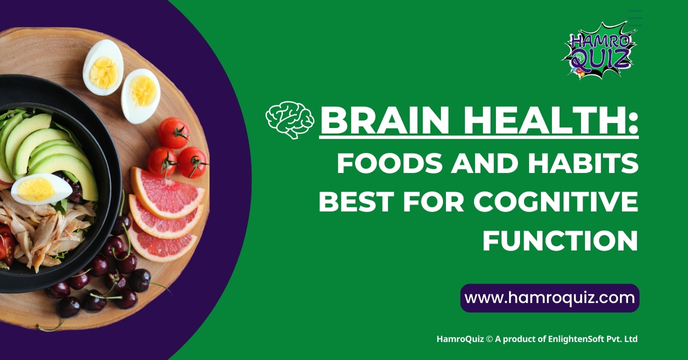
Why is brain health important?
As your brain serves as the central nervous system for all aspects of your life, maintaining brain health is essential to your general health and well-being, particularly as you become older. Improving the health of your brain can lower your chance of contracting illnesses linked to memory loss, such as dementia and Alzheimer's disease.
Dr. Amna Ramzan, a neurologist at Houston Methodist, states that there are two main components to brain health: neurocognitive brain health and mental and behavioral brain health. One affects our emotions, thoughts, and behaviors. The other affects our capacity to carry out routine everyday tasks like eating, taking a shower, and interacting with others in our community."
Every single day, we depend on both of these. What steps can we take, to foster normal brain function? In this blog, we'll explore the best food and habits for brain health and reveal the best diet.
The Best Diet for Brain Health
For general well-being, maintaining and improving brain health is essential. Appropriate dietary habits can strengthen memory, protect against neurological diseases, and increase cognitive performance. The health of the brain can be greatly impacted by a diet that is well-balanced and rich in particular nutrients. The following are essential components that comprise the best diet for brain health:
1. Omega-3 Fatty Acids
One of the omega-3 fatty acids considered essential for the proper operation of the brain is docosahexaenoic acid or DHA. They support the production of brain cell membranes in addition to possessing anti-inflammatory and antioxidant qualities that shield brain tissue. Eating enough omega-3 fatty acids may also lower the risk of Alzheimer's and dementia, according to a study. On the other hand, a lack of omega-3 fatty acids in food results in depression and brain health. Fatty fish are frequently brought up when discussing foods that are good for the brain because they are high in omega-3 fatty acids. You have about 60% fat in your brain, and omega-3 fatty acids make up slightly more than half of that fat. Since your brain needs omega-3 fats to form brain and nerve cells, they are essential for learning and memory. Some studies indicate that regular fish eaters have brains with higher amounts of gray matter. Nerve cells that regulate emotion, memory, and decision-making are found in gray matter.
Best sources: Fatty fish (salmon, mackerel, trout, sardines), yogurt, eggs, milk, plant-based oils, soy-based beverages, flaxseeds, chia seeds, and walnuts.
2. Antioxidants
Antioxidants protect from oxidative stress, which damages cells and plays a role in aging and neurological disorders. Since oxidative stress and inflammation may accelerate the aging of the brain and cause neurological diseases, antioxidants work to prevent them. Antioxidants present in blueberries have been shown to build up in the brain and enhance cognitive communication. Dark chocolate contains flavonoids, antioxidants, and caffeine, among other brain-boosting ingredients. Its cocoa content must be at least 70%. Plant chemicals with antioxidant properties are called flavonoids. These substances may improve memory and lessen the effects of aging on the brain. Additionally, compared to individuals who did not eat chocolate, those who consumed dark chocolate reported feeling happier. According to a study, dark chocolate might have an antibacterial impact that strengthens the gut-brain link and reduces depressive emotions.
Best sources: Berries (blueberries, strawberries, blackberries), dark chocolate, pecans, and artichokes.
3. Vitamin B
The brain requires the B vitamins, especially B6, B12, and folate. Their roles include the creation and regulation of neurological chemicals as well as the reduction of homocysteine levels, which are associated with cognitive decline and can cause the development of Alzheimer’s and other forms of dementia. The highest dietary sources of vitamin B6 include citrus-free fruit, potatoes, fish, beef liver, and other organ meats. According to Paula Doebrich, a qualified dietician and founder of Happea Nutrition in New York, "Vitamin B6 helps synthesize dopamine and serotonin." "Dopamine interacts with brain cells to cause euphoric behavior; it is linked to motivation and pleasure."
For the brain, nervous system, red blood cell production, and other vital functions to occur normally, the body needs vitamin B12. Deficits in vitamin B12 can cause symptoms such as headaches, exhaustion, and stomach problems. They can also cause nerve damage and cognitive impairments. Consuming a variety of food is crucial for supplying the brain with the right levels of B vitamins. Eggs include vitamins B6 and B12, which have good elements linked to brain health. Depression may arise from deficiencies in two B vitamin kinds, such as folate and B12. The production of brain chemicals and the control of blood sugar levels in the brain are further functions of vitamin B12.
Best sources: Leafy greens (spinach, kale), Chicken, Whole grains, Eggs, Milk and legumes.
4. Vitamin C
A medium orange provides nearly all the daily required vitamin C. Consuming vitamin C-rich foods like oranges may help prevent brain deterioration. One study found that better performance in activities requiring focus, memory, attention, and decision-making speed was linked to blood levels of vitamin C. One effective antioxidant that may lower the risk of brain cell damage is vitamin C. Additionally, vitamin C protects against diseases including major depressive disorder, anxiety, schizophrenia, and Alzheimer's disease and maintains brain health as you age.
Best Source: You can also get high amounts of vitamin C from other foods like bell peppers, guava, kiwi, tomatoes, and strawberries.
5. Polyphenols
Polyphenols' anti-inflammatory and antioxidant qualities promote brain health and enhance cognitive performance. According to Mosconi, hydrocinnamic acid is an antioxidant found in coffee beans. Due to its vasodilating (blood vessel widening) properties, caffeine increases blood flow to all of your body's organ systems, including the brain. Flavonols are present in dark chocolate, a plant-based chemical that prevents cell damage and reduces both inflammation and antioxidants. Studies have found a connection between eating dark chocolate and enhanced memory and brain function. For optimal effects, consume raw or dark chocolate that has at least 70% cacao.
As green tea contains caffeine as well, it may increase brain activity and improve performance, focus, memory, and alertness. L-theanine is another component of green tea that helps to support brain function. It is an amino acid that increases GABA neurotransmitter activity, which helps reduce anxiety encourages relaxation, and can cross the blood-brain barrier. According to one study, green tea's L-theanine minimizes the stimulating effects of caffeine, promoting relaxation. In addition to being high in antioxidants and polyphenols, green tea may help shield the brain against mental deterioration and lower the risk of neurodegenerative diseases. Green tea could perhaps enhance memory.
Best sources: Tea (green and black), coffee, dark chocolate, and red wine (in moderation).
Beneficial Dietary Habits for Brain Health
Apart from the consumption of brain-boosting foods, specific dietary practices can also improve brain function. It might be difficult to support excellent brain health because it requires implementing and maintaining appropriate lifestyle practices. Knowing the steps you should take and why they're important can help fuel your commitment to staying disciplined in your efforts. The following are some of the best routines to implement in your everyday life:
1. Eat a Balanced Diet
Make sure to incorporate a range of entire grains, fruits, vegetables, lean proteins, and healthy fats into your diet. A varied diet offers all the nutrients required for the best possible brain function.
2. Stay Hydrated
Dehydration can affect a person's mood, focus, and ability to think clearly. Try to consume 8 glasses or more of water every day if you engage in intense physical activity.
3. Make Use of Portion Control
Obesity is linked to cognitive deterioration and can result from overeating. To keep your weight in check, practice mindful eating and portion control.
4. Cut Back on Processed Foods and Sugar
Oxidative stress and inflammation are linked to processed foods and high sugar intake, and these factors may harm brain function. Aim for complete, unprocessed meals whenever feasible.
5. Follow a Mediterranean Diet
It has been shown that a Mediterranean diet high in fruits, vegetables, whole grains, fish, and healthy fats improves cognitive performance and lowers the risk of Alzheimer's disease.
Lifestyle Habits to Boost Brain Health
In addition to diet, the following lifestyle practices are essential for preserving and improving brain health:
1. Regular Physical Activity
At least 30 minutes of regular exercise every day will increase blood flow to the brain, improving mood, perspective, clarity of thought, creativity, and problem-solving abilities.
You don't have to work too hard to reap the benefits of exercise; just a few walks a week can improve your cognitive function. However, the most effective positive outcomes seem to happen in longer sessions than thirty minutes. If you are struggling to find time to work out, remember that any fun activity you enjoy that also requires physical activity is good for you!
2. Mental Stimulation
Take up mentally challenging activities like puzzles, quizzes, reading, picking up a new skill, or playing an instrument. You can play mind-challenging games on Hamroquiz to boost your brain. You can also read our other blog on how Playing quizzes can Boost your Brain Health.
3. Quality Sleep
A healthy brain requires getting enough sleep. Sleep helps you stay alert, concentrate, and capable of making thoughtful decisions. Sufficient sleep is necessary for cognitive function and retention of memories. 7-9 hours of well-rested sleep each night is what is needed.
4. Social Interaction
Participating in social activities and keeping social bonds can enhance cognitive performance and lower the incidence of dementia.
5. Stress Management
Prolonged stress can harm the brain and reduce one's ability to think clearly. Practicing stress-reduction strategies including yoga, meditation, and mindfulness can be beneficial.
Give your best to protect your Brain Health
As the brain is a complex organ that controls all bodily functions, including mental activity, emotional state, motor abilities, and vision, to maintain cognitive function and protect against neurological diseases, adopting the healthiest diet and lifestyle choices is essential. You may improve your general well-being and the functioning of your brain by adopting healthy lifestyle practices and sticking to the best diet for brain health.
